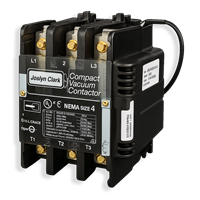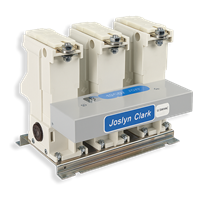The Importance of DC Contactors in Industrial Motor Control
DC motor contactors play a vital role in industrial motor control. These electromechanical switches control the operation of DC motors at high levels of current and voltage. Explore the functions of DC contactors, their advantages, and why they are important for reliable control of DC motors.
What is a DC Motor Contactor?
A DC motor contactor is like an on-off switch for the DC motor. It has a coil that's connected to a power source and contacts that are connected to the DC motor. When you turn on the switch, electricity flows through the coil and creates a magnetic field.
The magnetic field pulls the contacts together, allowing electricity to flow to the motor and making it run. When you turn off the switch, the magnetic field disappears, and the contacts open, stopping the motor.
Types of DC Motor Contactors
Different types of DC contactors include: air contactors, vacuum contactors, and magnetic contactors. Air contactors are the simplest kind and are used for low voltage applications. Vacuum contactors are great for heavy-duty jobs because they're made to handle high voltage and current. Magnetic contactors are used a lot in industries because they can handle high voltage and current, too.
Advantages of DC Contactors
DC motor contactors offer several advantages over other types of motor control switches. They are highly reliable and can handle high voltage and current levels, making them ideal for use in heavy-duty applications. They also have a long lifespan and require minimal maintenance. Additionally, DC contactors are easy to install and operate, and they are available in a range of sizes and configurations, making them suitable for a wide range of applications.
Applications of DC Contactors
DC contactors are used in various industrial applications, including motor control, lighting control, power distribution, and HVAC control. They are commonly used in cranes, hoists, elevators, and conveyor systems, where they play a critical role in ensuring the safe and reliable operation of these systems.
Why DC Contactors are Important for Reliable Control of DC Motors
DC contactors are essential for the reliable control of DC motors. They provide a safe and reliable way to turn on and off the motor, protecting it from damage due to overheating or overloading. Additionally, they allow for precise control of the motor's speed and direction, making them ideal for use in applications where accuracy is essential. Without DC contactors, industrial motor control systems would be less efficient, less reliable, and more prone to failure.
In conclusion, DC contactors are critical components of industrial motor control systems. They provide a safe and reliable way to control the operation of DC motors, ensuring the efficient and precise operation of a wide range of industrial applications. Whether you are designing a new motor control system or replacing an existing one, it is essential to choose the right DC contactor for your application to ensure the safe and reliable operation of your equipment.
Frequently Asked Questions
Q: What is the difference between DC contactors and relays?
A: DC contactors are designed to handle high levels of current and voltage, making them ideal for use in heavy-duty applications. Relays, on the other hand, are designed for low power applications and are not suitable for high voltage or current levels.
Q: What is a vacuum contactor?
A: A vacuum contactor is a type of DC contactor that is designed to handle high voltage and current levels. It uses a vacuum to extinguish the arc that is created when the contacts open, making it ideal for heavy-duty applications.
Q: How do I choose the right DC contactor for my application?
A: Consider the voltage and current requirements of your application, as well as the size and configuration of the contactor. Also, choose a contactor that is designed for your specific application.
Q: What are the advantages of using a DC contactor over a solid-state relay?
A: Reliability and robustness makes DC motor contactors them ideal for use in heavy-duty applications. They also have a long lifespan and require minimal maintenance. However, solid-state relays are more suitable for low voltage and current applications and are less reliable.
Q: How do I install a DC motor contactor?
A: Install DC contactors by connecting the coil to a power source and the contacts to the DC motor. Prevent shock of damage by ensuring proper grounding. Your manufacturer's installation instructions will walk you through proper installation.
Q: How do I troubleshoot a faulty DC contactor?
A: If your DC contactor is not working properly, it may be because of faulty coil or contacts. Ensure wiring connections are secure and properly grounded. If the problem persists, it may be necessary to replace the contactor.
What are switching transients and how to minimize them with vacuum contactors
Vacuum contactor mounting best practices
CV Series Compact Vacuum Contactor
Joslyn Clark’s Compact CV Series Vacuum Contactors and Starters are ideal for tough industrial applications. The compact design provides flexibility for retrofitting air break contactors, thus enabling an existing application to continue with maintenance cost and down time eliminated. Voltage raging from 600V to 1500KV and current ratings up to 600A are available.Learn more »
MVC Series Medium Voltage Vacuum Contactor
The Joslyn Clark USAVAC medium voltage vacuum contactors are 3-phase motor contactors built for control and protection in medium voltage applications ranging from 2300V to 7200V. Current ratings of 200-1200 ampere, and motor ratings up to 7000 HP at 6600V are available.Learn more »




